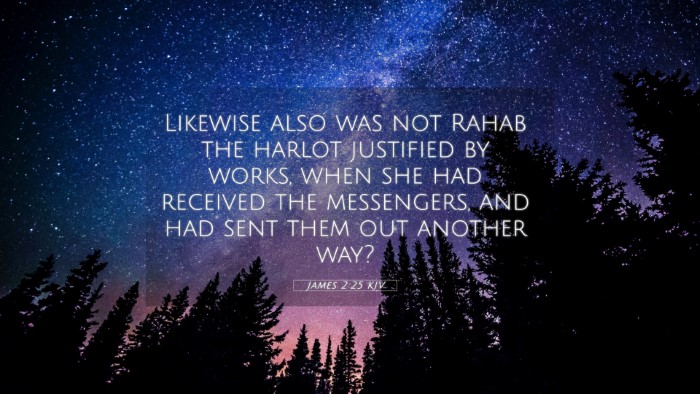Old Testament
Genesis Exodus Leviticus Numbers Deuteronomy Joshua Judges Ruth 1 Samuel 2 Samuel 1 Kings 2 Kings 1 Chronicles 2 Chronicles Ezra Nehemiah Esther Job Psalms Proverbs Ecclesiastes Song of Solomon Isaiah Jeremiah Lamentations Ezekiel Daniel Hosea Joel Amos Obadiah Jonah Micah Nahum Habakkuk Zephaniah Haggai Zechariah MalachiJames 2:25 Similar Verses
James 2:25 Cross References
Likewise also was not Rahab the harlot justified by works, when she had received the messengers, and had sent them out another way?
Uncover the Rich Themes and Topics of This Bible Verse
Listed below are the Bible themes associated with James 2:25. We invite you to explore each theme to gain deeper insights into the Scriptures.
James 2:25 Cross Reference Verses
This section features a detailed cross-reference designed to enrich your understanding of the Scriptures. Below, you will find carefully selected verses that echo the themes and teachings related to James 2:25 KJV. Click on any image to explore detailed analyses of related Bible verses and uncover deeper theological insights.

Hebrews 11:31 (KJV) »
By faith the harlot Rahab perished not with them that believed not, when she had received the spies with peace.
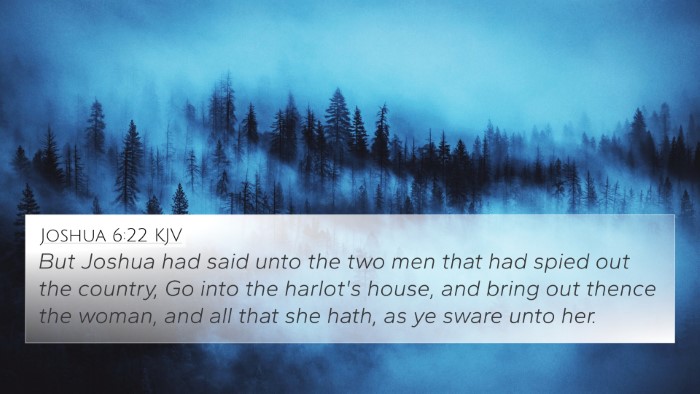
Joshua 6:22 (KJV) »
But Joshua had said unto the two men that had spied out the country, Go into the harlot's house, and bring out thence the woman, and all that she hath, as ye sware unto her.

Joshua 2:19 (KJV) »
And it shall be, that whosoever shall go out of the doors of thy house into the street, his blood shall be upon his head, and we will be guiltless: and whosoever shall be with thee in the house, his blood shall be on our head, if any hand be upon him.

Joshua 2:1 (KJV) »
And Joshua the son of Nun sent out of Shittim two men to spy secretly, saying, Go view the land, even Jericho. And they went, and came into an harlot's house, named Rahab, and lodged there.

Joshua 2:15 (KJV) »
Then she let them down by a cord through the window: for her house was upon the town wall, and she dwelt upon the wall.
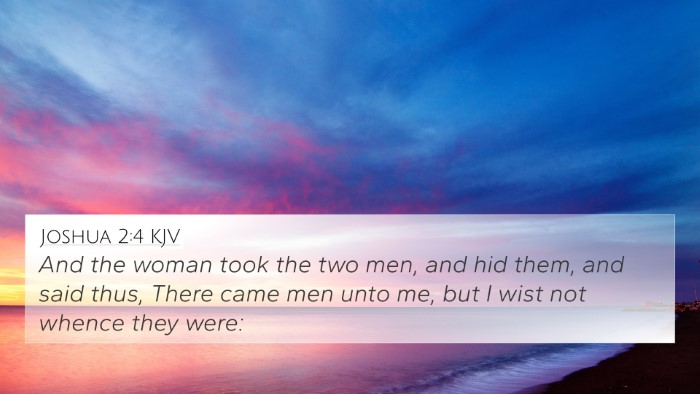
Joshua 2:4 (KJV) »
And the woman took the two men, and hid them, and said thus, There came men unto me, but I wist not whence they were:
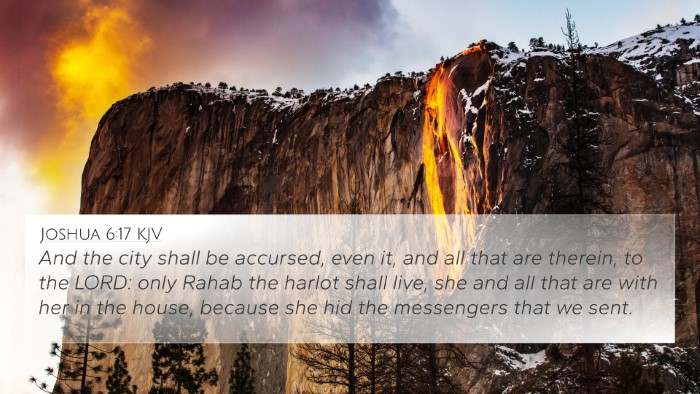
Joshua 6:17 (KJV) »
And the city shall be accursed, even it, and all that are therein, to the LORD: only Rahab the harlot shall live, she and all that are with her in the house, because she hid the messengers that we sent.

Matthew 21:31 (KJV) »
Whether of them twain did the will of his father? They say unto him, The first. Jesus saith unto them, Verily I say unto you, That the publicans and the harlots go into the kingdom of God before you.
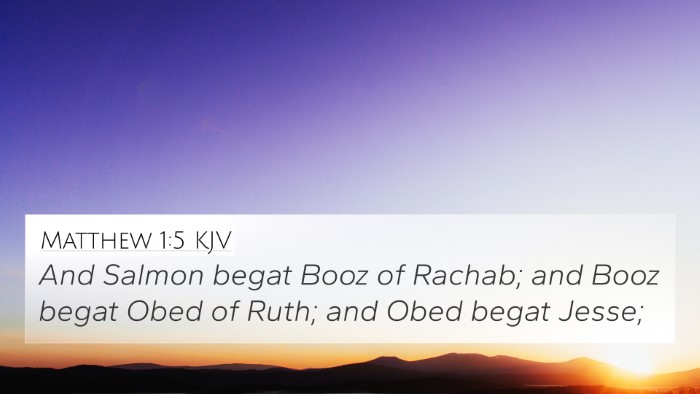
Matthew 1:5 (KJV) »
And Salmon begat Booz of Rachab; and Booz begat Obed of Ruth; and Obed begat Jesse;

Joshua 2:6 (KJV) »
But she had brought them up to the roof of the house, and hid them with the stalks of flax, which she had laid in order upon the roof.
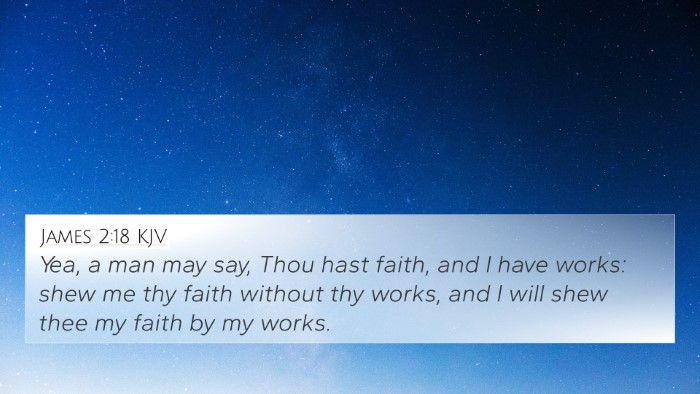
James 2:18 (KJV) »
Yea, a man may say, Thou hast faith, and I have works: shew me thy faith without thy works, and I will shew thee my faith by my works.

James 2:22 (KJV) »
Seest thou how faith wrought with his works, and by works was faith made perfect?
James 2:25 Verse Analysis and Similar Verses
Understanding James 2:25
James 2:25 reads: "In the same way was not Rahab the harlot also justified by works when she received the messengers and sent them out another way?" This verse emphasizes the significance of faith demonstrated through actions, highlighting Rahab's faith and works as a model of genuine belief.
Contextual Background
The Book of James emphasizes practical Christianity and the necessity of active faith. In this section, James compares the faith of Abraham and Rahab to illustrate that faith without works is dead. Rahab's story serves as a testament to how true faith produces actions that align with God's will.
Commentary Insights
-
Matthew Henry:
Henry comments on Rahab’s faith, emphasizing that she acted upon her belief in God. By receiving the Israelite spies and protecting them, she demonstrated her faith through decisive actions, marking her justification by works.
-
Albert Barnes:
Barnes highlights how Rahab’s actions are significant as they show her faith in the God of Israel, contrasting her with the unbelief of her own people. He indicates that her faith led to her salvation, not just in a spiritual sense but also literally by preserving her life and her family during the destruction of Jericho.
-
Adam Clarke:
Clarke notes that Rahab's justification is a powerful example of faith in action. He asserts that her reception of the spies and the risks she took reflect a profound trust in the God of Israel, demonstrating a bond between faith and obedience that is essential for true justification.
Bible Verse Connections
This verse relates to numerous biblical texts that reinforce its themes of faith and works. Below are significant cross-references:
- Hebrews 11:31 - Rahab's faith is celebrated in the "Hall of Faith." Her belief led to her being saved from the city’s destruction.
- Matthew 7:21 - Emphasizes that not everyone who says they believe will enter the Kingdom of Heaven; it’s essential to do the will of the Father.
- Romans 4:2-3 - Discusses Abraham’s justification by faith, illustrating the principle that faith is evidenced through actions.
- Ephesians 2:8-10 - Highlights the relationship between faith and works, stating that we are saved by grace through faith, which should lead to good works.
- Titus 3:8 - Reinforces that believers should be careful to engage in good works, showing faith in action.
- Galatians 5:6 - Points out that faith operates through love, indicating that expressive actions of faith involve genuine care for others.
- Matthew 25:35-40 - The parable of the sheep and goats illustrates that helping others is tantamount to serving God, similar to Rahab’s actions.
- 1 Peter 2:9 - Calls believers a royal priesthood, emphasizing that we are called to proclaim God’s praises through our actions.
- Acts 15:19-20 - The early church emphasizes the importance of faith leading to moral living, similar to the faith exhibited by Rahab.
- John 15:8 - Jesus teaches that bearing fruit glorifies the Father, connecting faith and works in the life of a believer.
Thematic Connections
Rahab's actions can be seen as a precursor to the New Testament understanding of faith, where belief is intrinsically linked to action. The notable thematic elements include:
- Faith and Works: James clearly establishes that genuine faith is active and evidenced by works.
- Divine Mercy: Rahab’s inclusion in the lineage of Jesus demonstrates God’s ability to use anyone, regardless of their past, to fulfill His purposes.
- Obedience to God’s Will: The emphasis on acting upon faith demonstrates that observing God's commands is essential in showing true belief.
Practical Application
Understanding James 2:25 encourages believers to reflect on how their faith manifests in their daily lives. It prompts questions such as:
- How are we actively demonstrating our faith in our communities?
- What actions does our faith call us to take in the face of adversity?
- In what ways can we emulate Rahab’s courage and belief in God’s promises?
Conclusion
James 2:25 serves as a powerful reminder that faith is not merely a confession but must be substantiated through action. Rahab’s story illustrates that no one is beyond redemption and that faith, when genuine, produces an outward manifestation aligned with God’s purposes. By exploring the connections between this verse and others, believers can deepen their understanding of the interplay between faith and works across the scriptures.

